The Other Half
The Other Half is a new centre of research for practical, workable policy in the interests of women.
It is a new and non-partisan think tank, based in the UK. They explore policy options that work for women. They will spur mainstream political thinking which builds women’s interests in from the start, considers whole system change, and properly represents the richness and reality of modern life. Their work spans public life, justice, and family.
The Mission
Feminists have made great progress in the last 100 years, but there is still much to do. Women remain underrepresented in public life; many women live in financial precarity because of their role as mothers and carers; and women are still the victims of violence and sexual abuse.
At the same time, political thinking needs to keep pace with the developments of the 21st century. In the past, technological development has been both helpful and harmful to women’s interests. What does feminism look like in an age where the working world is fundamentally changed by AI, where violent content can be accessed online at any time, and where new forms of assisted reproduction like surrogacy and egg freezing are rapidly increasing in popularity?
Much mainstream political thinking is still distanced from the reality of ordinary women’s lives. Our approach is different. We consider whole-system change: women’s interests should be at the heart of policymaking, not an afterthought. We recognise that women are not a single constituency: women are half of the country’s population, and have a wide range of values and priorities. And we focus on what works, building on decades of work to identify political options that can make real change.
The Values
Responding to the concerns of UK women, in all their diversity.
Much mainstream political thinking is distanced from the reality of women’s lives today. Women in the UK are particularly concerned about crime and safety, the cost of living, and the welfare of children. We believe these concerns should be taken seriously.
Valuing motherhood.
80% of UK women will be mothers; most people report that spending time with their families is one of the most important things in their lives. We need to think seriously about how motherhood, care, and families can combine with public life, rather than being squeezed into the margins.
Belief in the potential of all humans.
Both men and women can make valuable contributions to society: at home, as well as in the workplace and in politics, arts, and science. We want to build a society where all of these contributions are encouraged from people of either sex.
Promoting connected societies.
Modern economies treat people as atomised individuals, but in reality, we all depend on others at some point in our lives. Relationships with others, in our families and communities, are important to us; we are all interlinked. Care, dependence, and human relationships should be at the heart of political thinking.
Cautious optimism on new technology.
We are optimistic about the power of technology to improve people’s lives. But we do not assume that all technological development will automatically be a positive for everyone; we must consider the interests of more vulnerable people in society, when adopting new inventions.
The People
Fiona MacKenzie MBE is an actuary with a background in corporate and technology change in the City. In 2018, she founded the We Can’t Consent To This campaign, a response to normalisation of violence against women and girls. For this work she has been awarded an MBE. Fiona is also the treasurer for the Centre for Women’s Justice.
Louise Perry is a journalist and author. Her first book, The Case Against the Sexual Revolution, was published in 2022. Louise is a features writer for the Mail, and her work can also be found across the New Statesman, The Times, The Spectator and UnHerd.
Olivia Robey is a policy specialist, whose previous work includes advising the British Government on efforts to combat violence against women and children. Olivia also works with police leadership nationally on safeguarding and vulnerability.
Ellen Pasternack is a recent PhD graduate in evolutionary biology at Oxford University. Her writing on feminist issues through a biological lens can be found at The Critic, UnHerd, The Spectator, and New Statesman.
The Funders
We are a non profit.
The Other Half received funding from Emergent Ventures, a grant and fellowship program from the Mercatus Centre at George Mason University.







Commentaires récents